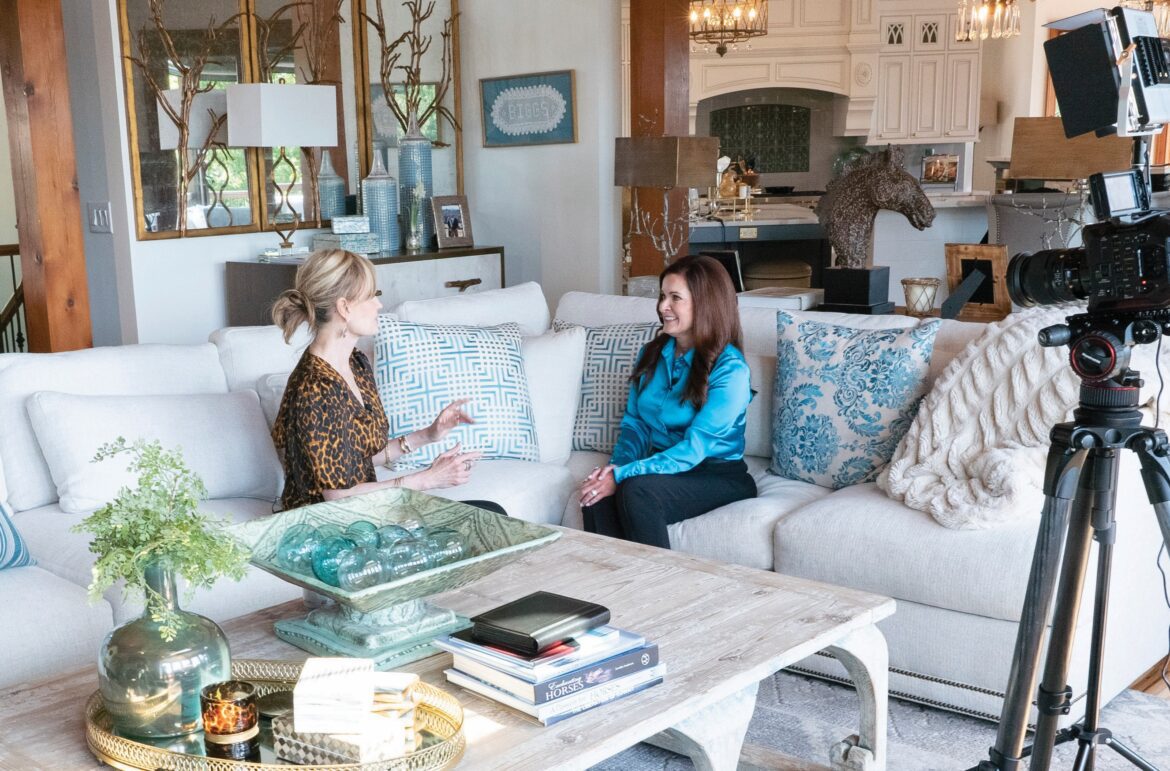SHERI BIGGS has a servant’s heart, strengthened by her faith and her training. Sheri joined the military at age 40 and has since been deployed as a medical crew director in the Middle East. Today, she is a lieutenant colonel at Joint Force Headquarters & serves in operations as a liaison of Air Force & Army resources. Throughout her life, Sheri has worked with veterans, and she has dedicated a tremendous amount of time to counseling veterans contemplating suicide. Her legacy is one of compassion, a trait that has defined her character in all aspects of her life.
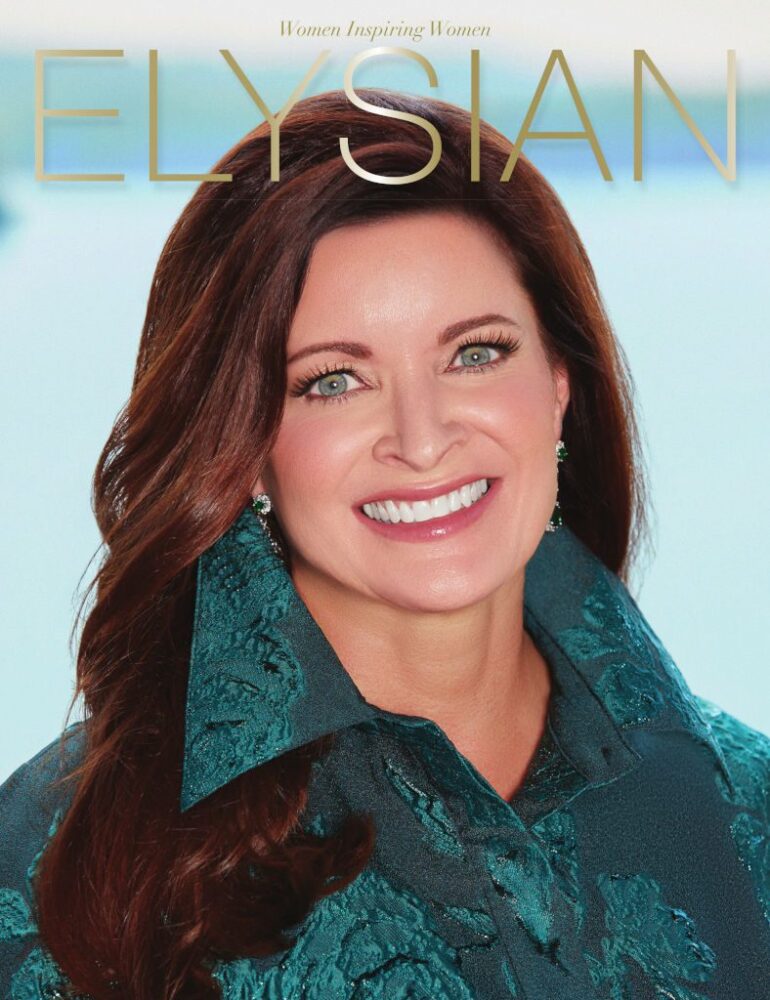 You grew up in a very rural setting in a small town in Mississippi, called Kosciusko. How many people were in your graduating class of high school?
You grew up in a very rural setting in a small town in Mississippi, called Kosciusko. How many people were in your graduating class of high school?
Kosciusko is north of Jackson and I graduated high school with one hundred classmates.
What was your father’s occupation?
My father was in car sales.
Your husband Bill is a successful businessman with a gift for marketing and sales. Do you see characteristics of your father in your husband?
There are a lot of similarities. I respect both very much.
Your mother was very traditional.
Yes. I call my mother “Our Rock” because she never was outwardly upset by anything. She was always steady and made sure that everything was taken care of.
Is that where your temperament came from? You are seemingly a very steady person.
Not at all. I think I unfortunately act a little more like my dad now.
That is funny because I do not see any “wavering” as a part of you. I see a very tempered and consistent leader. Does your father have a short trigger or a long trigger?
Short trigger.
And your mother was very tempered with a long fuse?
Very much so.
Which of the two are you most alike?
I am a combination of both. But with the things that I feel very passionate about, I do not mind speaking up.
When I met you, I had no idea that you were in the military. You are the consummate refined and elegant, southern woman. Are people confused by your profession?
Sometimes. People tend to think that strong leaders are tall, loud, and very outgoing, which is not always the case.
There are the silent servant leaders.
I would agree with that.
What was your first job?
The first job I had was to babysit, and that was long before I was old enough to work. Later, I was introduced to a lady at my church that had a clothing store. I could not wait until I was 16 and was able to work for her.
I find it interesting that many of the Elysian Circle Inspiring Women are multidimensional, in that they have ascended in a certain professional path and yet are also attracted to design, fashion, and art. What are your thoughts on that?
But for me growing up in a small town, my parents worked very hard. I’m extremely grateful for the values instilled in my brother & me. Our parents focused on core values in a faith-based family. We worked hard for what we had. They sacrificed much & I wouldn’t trade my experiences for anything.
What lesson did you learn from your experiences in working retail?
Ms. Elizabeth Joseph, the woman I worked for, was a dear friend of our family’s. I had so much respect for her. When she came to me and told me that I did a good job it was so very rewarding. I wanted to please her and to do well . . . and that desire and drive led to my success.
Is that what defines leadership? Helping people understand their potential?
Core to success I believe, is finding satisfaction in what you do. Whatever that means to you as an individual, it will be different for everyone. For me, it was rewarding to work for her because I felt it was a job I could do well and I enjoyed the work. In the final analysis, I guess what we did also made people happy, which was satisfying.
How did you enter the field of nursing?
I was in high school, and my teacher recommended me to a local healthcare clinic, the Family Medicine Clinic. I applied and that was the beginning of my healthcare career.
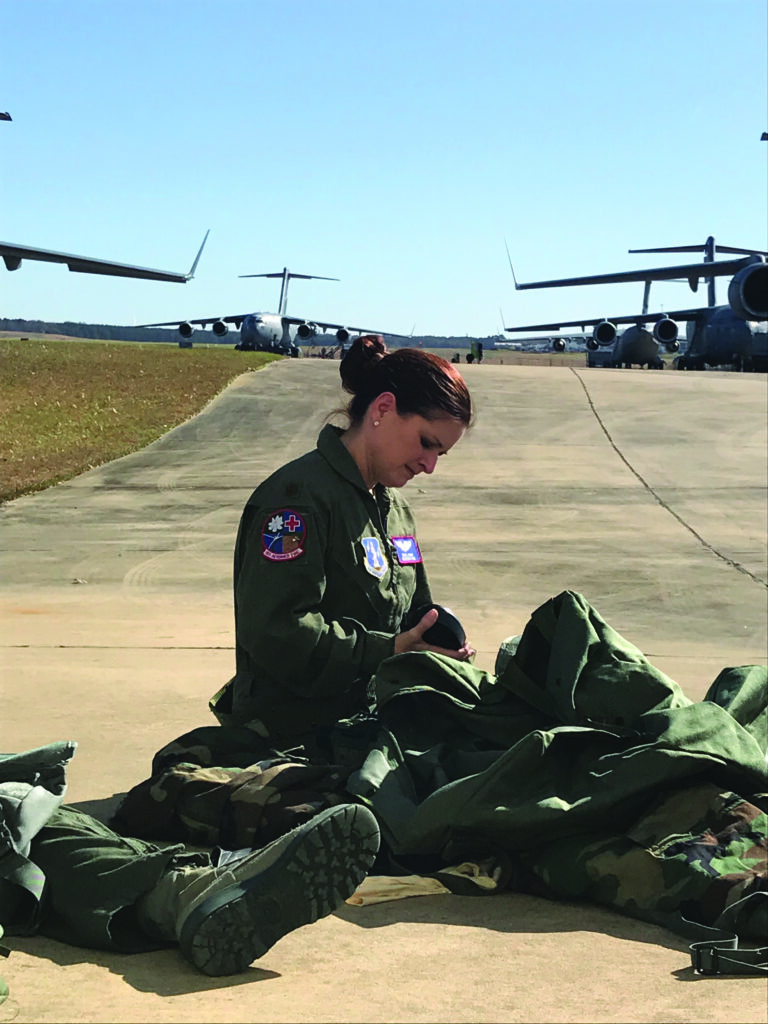
Your first job was babysitting. Was there a natural propensity to be a care-giver or was it from watching your mother?
I am not sure. I did not find out until years later, but my grandmother, my dad’s mother whom I was very close to, was a caregiver. She did not have a nursing degree, but she worked as a nurse which was a goal of hers. Back in those days, it was not looked favorably upon, by her parents, to have employment. It was something that young ladies just did not do. It is odd how things change. At a young age, I knew what I would do for the rest of my life.
You had a very traditional life in that you married at age 26. Did you work during that time as a nurse?
I went straight from college into nursing. My first job was in the intensive care unit which coincidentally was the area that I felt most inadequate in school. It was a little intimidating.
Was that by choice?
Yes, there was an opening in that area. I felt if I could work there and be successful, then I could work in any area.
What about intensive care made you uncomfortable?
The ventilators, equipment, and plethora of medications were intimidating.
You witnessed a significant amount of death and dying at a young age. Do you remember the first time that you experienced death?
Actually, I do.
And was the person older or younger?
They were older, which I think helps, but there still was a sense of loss. As years went on, I grew to realize that there are a lot worse things than death.
When you are watching a person leave, are there takeaways that you can share?
If there is something left unsaid with any person, no matter if you are healthy or sick, you should speak. Do not let the day pass before you share that information with them because there is no guarantee for a tomorrow. Knowing where you personally stand, spiritually is also very important.
Your faith has been an important part of your life. Was there ever a period when you lost your faith?
I never completely lost my faith, but I went “off track” and it affected me.
How do you recalibrate to make sure that that does not happen again?
Reading scripture, being prayerful on a daily basis, and reflecting on where I am in my relationships.
Is that part of your daily routine?
Most definitely. I try to make that a priority in the early mornings when it is quiet.
In all the years of your nursing was there one incident that caused you the most heartache?
I can’t really recall a specific incident but the loss of younger people to me is the most difficult to reconcile and harder to cope with.
As a caregiver is there a heightened responsibility with those on the verge of death?
Oh yes. Being with that person and letting them know that you are there at the end is important. I have made it a point to be with veterans while they are actively dying, particularly those who do not have family members.
Why do you do that?
Sharing that experience and being there with each other at the end, is compassion.
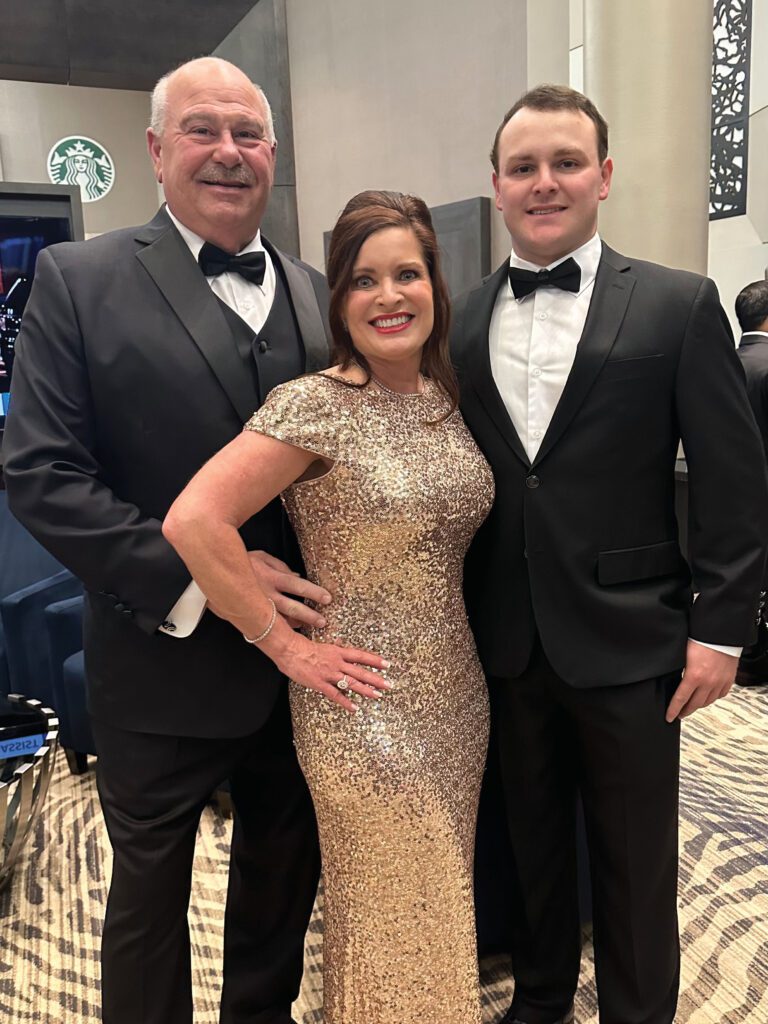
Lieutenant Colonel Sheri Biggs with husband Bill, and son Austin at Sarah Huckabee Sanders’ Inaugural event in Little Rock, Arkansas.
Tell me about your son Austin.
Austin is very much like me. He cares deeply about people, is compassionate, and loves animals. He is a hard worker. I call him an old soul. From the time he was very young, he was like a little man in a kid’s body. He loves talking to people. He is a very bright spot in my life.
At what time did you decide to enter the military?
I was 40 years old at that time. I had my nursing degree, as well as a licensed nursing home administrator. It was when I was discussing my regret not having previously considered the military, that the General informed me special consideration was given to medical professionals, despite age.
What did you do to join?
I didn’t interact really with the recruiters. I commissioned in front of the state veterans affairs board for which I worked & the residents of the Home. Then, I went to Officers Training School at Maxwell Air Force Base and on to Wright Patterson Flight School in Ohio.
Was there ever a point during that process that you said,“This is not for me?”
Yes, definitely. When I showed up for Officer Training school, and as I was being in-processed, the officer started yelling at me because my hair was not within regulations. I had no idea what I was doing. I didn’t even know how to salute properly, and this soldier was yelling at me at 40 years old. I figured it out pretty quickly from there.
Did you reach a point where you knew it was a perfect fit?
The military is never something that I feel 100% comfortable with. I always feel like there is more to learn, much more to do. In the military, there is always an agenda. During my deployment in the Middle East, the light bulb finally came on because all the training I had done previously was put into play. It was a very rewarding experience for me.
When were you deployed, and how many women were in your crew?
I was deployed to the Middle East in 2017. There were other women from my squadron, but my position was as a medical crew director running the AE crew in the back of the plane. I was the only female on the crew.
What is an AE and what does that entail?
Aeromedical evacuation. Basically, we set up a hospital in the back of an aircraft. We ran several missions. The patients are categorized according to their priority level.
Typically, you provided assistance to Americans that had been wounded mostly with IEDs, I assume?
There were different reasons for treatment. We helped mentally ill patients as well.
Mental health is a big issue in the military, stemming from what happens to people under tremendous stress.
Mental illness does not just affect veterans. Post covid, as a nation, people are struggling with an inability to cope. Whether from a lack of resources or support structure, mental illness is a big challenge for our country.
What is the number one reason you provide medical aid in Air Vac?
Just like in a hospital, people are treated for different things . . . a combination of combat and non-combat illnesses and injuries, if considered life-threatening.
How long were you deployed?
It was six months and lasted into 2018. I was planning on being gone this year, but my job changed. Currently, I work at Joint Force Headquarters as a liaison between the Army and the Air Force.
This is preparation for what?
Anything that may be coming around the corner, be it natural disasters or wartime.
What is your fundamental belief about war?
I go back to the basics and what our country was founded on. I do not think we should look for trouble, but we should never back down. Should the situation cause us to stand up for our freedoms, and the things that our forefathers have fought so hard for, then war is appropriate.
We live in a complicated world right now.
It is. People are angry and I do not think that helps. I hope one day we work together and compromise for a greater cause or solution . . . and become as independent as possible as a nation.
You currently serve as a lieutenant colonel in the armed services. What does that require?
You are held to higher leadership standards.
In hierarchy, over lieutenant colonel is colonel . . . and over that is … ?
General.
Are there any women generals?
Yes, there are a few.
Are any of them a former nurse?
Not currently, but there have been in the past. One of my mentors was an army nurse, General Martha Jo Leslie. In fact, the veteran’s home that I worked for years earlier is named after her. She was over the state Veterans Affairs board when I went to work there. She has been a wonderful mentor to me, gave me good advice and I have always looked up to her.
Other than your previous mentor, to your knowledge are there any other generals who joined the military as nurses?
No. I was fortunate to have had the opportunity to meet General Catherine Lutz of the Mississippi National Guard. She began her career as a nurse.
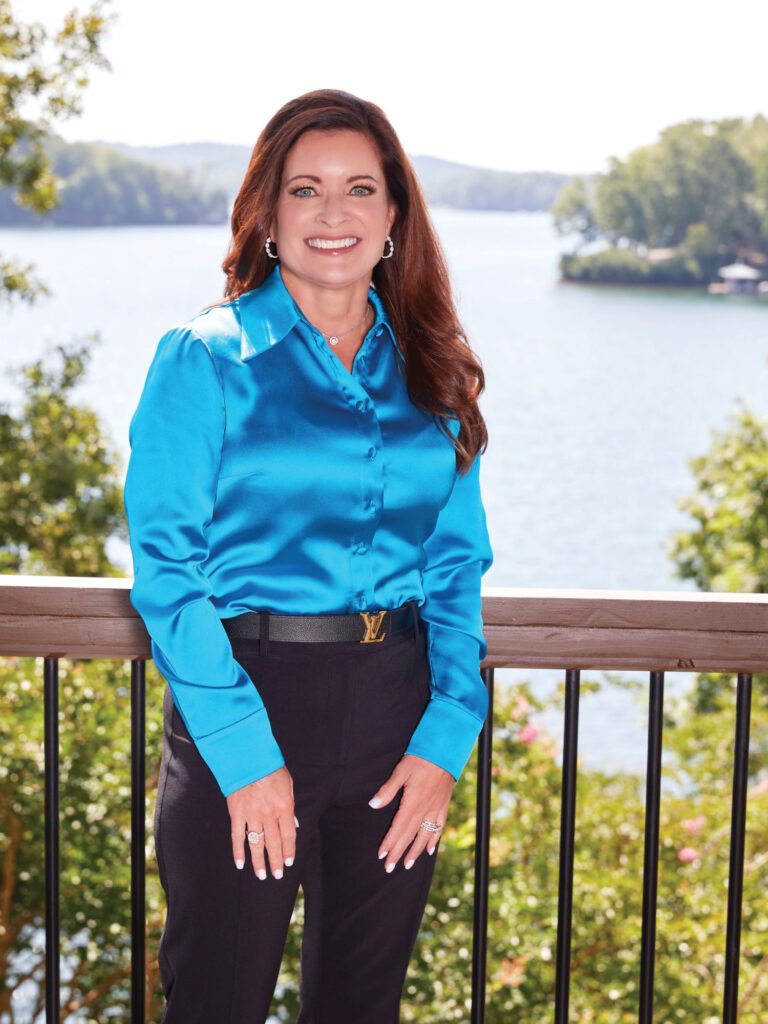
PHOTOGRAPH BY MICHAEL PANICCIA
When did you meet your husband, Bill?
I met Bill when I was in the long-term care industry years ago professionally. We reconnected in 2016 when I went to work for him as a consultant.
Did you have any idea that you would be married?
Never.
Do you and Bill laugh about it now?
We do.
Professional colleagues first, that grew into a friendship. When did it shift from friendship to a life partner?
He started showing up at whichever location I was working, which I noticed. I invited him to go with me to a friend’s wedding in New Orleans, but the invitation was extended just as friends. I think that event was a turning point.
What does he think about you being on another deployment?
He does not enjoy it as much as I do. I look forward to it and find it challenging but Bill is pro-military and understands sacrificing for the needs of our country. He is very supportive. I could not ask for anyone any better, but I also know he worries when I am gone.
Do you see deployment as a possibility in the future?
Yes, I think so.
Are you ever frightened?
Not for myself.
And why is that?
I am not sure. I know when I was getting ready to go over to the Middle East, I was uncertain as to how I would respond in a combat situation. A lot of not being afraid has to do with my faith. We are vulnerable in many ways, but I did not worry about those things. I always think about the Bible verse “Greater is He that is in me than he that is in the world.”
You are comfortable with death?
I am.
There is a randomness of death. Do you believe when it’s your time, it’s your time?
Certainly. I go back to my faith. It is not our plan and we do not have control. There are reasons that things happen, and we cannot see the big picture. We will one day, but until then, I don’t think we can explain why things happen as they do, including death.
What do you want to be remembered for?
I think that people may forget what you say. They may forget what you do, but they never forget how you make them feel. I want people to remember how I made them feel.
You have dedicated a tremendous amount of time to counseling military veterans who are suicidal. Why?
I was put on this earth to serve in a lot of different capacities. It is our obligation to take care of each other. If I can offer one glimmer of hope to someone who is struggling, then there is a chance that that person can find a brighter day.
Have you ever counseled a person contemplating suicide who followed through?
Not yet.
Yet you have counseled many, many, many soldiers and vets?
I have, but when I was completing my doctorate, they told us “It is not a matter of if, but a matter of when.” I do not look forward to that day. I do know it is a possibility.
What do you tell a person contemplating suicide?
I think it is important for people to know that someone cares.
How do you sustain a feeling of caring for someone when you’re transient in their life?
Well, I think it goes along with what I just said about how you make them feel. If you are engaged and let them know that you are genuine and sincere, and you truly want something better for that person, I think they feel it.
Is this type of work emotionally draining for you?
Some days, yes, it is.
And how do you stay healthy and whole?
My spiritual well-being plays a big part for me and asking God for direction in my life. What is my next move? Where do you want me?
You have this very calm facade, but you have pressure. How do you release the stress?
I am a note-taker, so as I check things off my list, it helps. I love walking and I live on a lake, so I take my dogs out on the trails and just enjoy being outdoors.
Nature is a big part of your well-being.
Oh yes.
If you get to ask God one question, what would you ask him?
First & foremost, I would praise Him for my salvation. I would express my deepest gratitude for overflowing blessings and His tremendous grace shown to me.
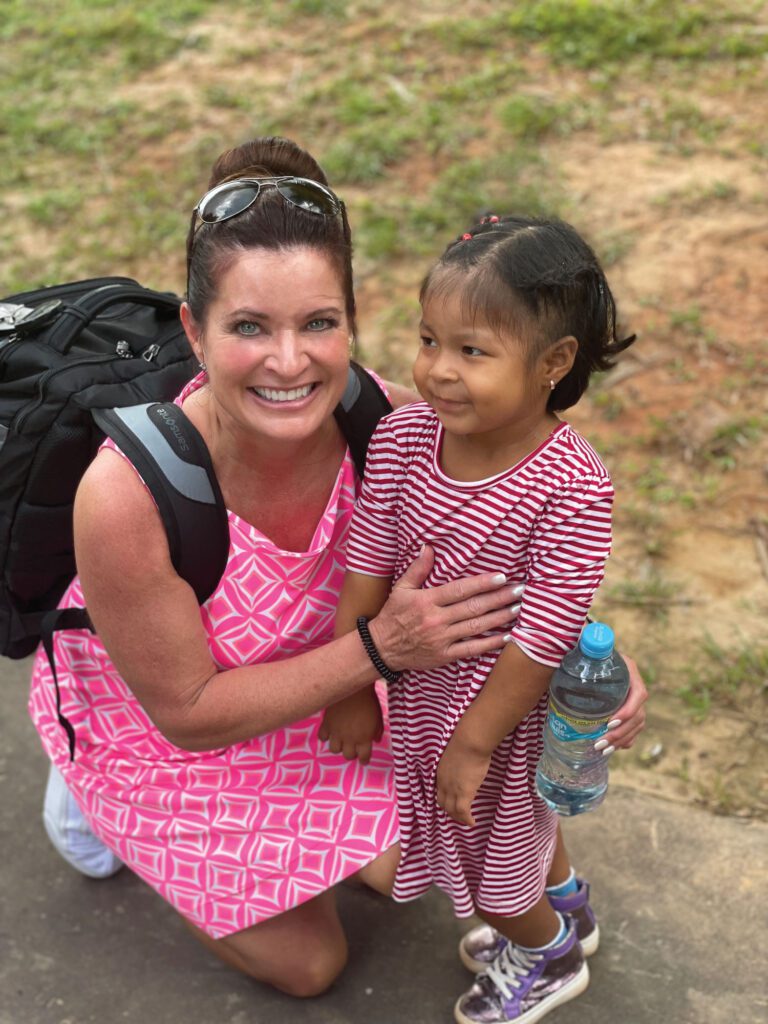
Sheri on a life-changing experience in Peru, where she visted an orphanage to help with funding and various needs.
Why did you go to Peru?
My son and I went to Peru to visit an orphanage run by Israel & Cynthia Mendez. I was able to meet with them and tour the home and a school which is right there on the property. There were seven of us who went to work to see what we could do to help with funding and the various things that they needed. It was a life-changing event for me for sure.
How many children were in the orphanage?
There were 53 children there. Mi Refugio Children’s Home is located about one and a half hours from Iquitos, Peru and thirty minutes from Nauta. Nathan Sears is the Pastor responsible for starting this great ministry. Israel and Cynthia Mendez are the directors of the Children’s Home and live there full-time. They have outreach missions, La Roca, in the surrounding communities to set up churches and teach families about Jesus Christ. There is a school on the property of the Orphanage that allows local children to attend from the surrounding areas. The government graciously provides teachers to educate the children.
Did you want to adopt any of the children?
I wanted to bring them all home, but the problem is, how I would go in and walk out with one child or two children and leave the others? Many of the children have experienced trauma and have stories that will follow them throughout their lives. You just look at them and wonder how anybody could mistreat a child. We brought small gifts, and they were so appreciative. We had interpreters to help with the communication and held children’s bible studies while we were there.
I want you to pretend that I am a young woman. What “one nugget of gold” or bit of advice can you share that could potentially help me . . . based on something that you experienced?
Growing up in a small town, I lacked self-confidence. I learned that no matter where you come from, regardless of your socioeconomic background, you have the potential to be and do anything that you want. My faith was the most important thing in acquiring that strength and courage to know that I can accomplish anything that I dream of. ■
Editor’s note: The views expressed here are personal to Sheri Biggs and do not in any way represent those of the United States military.

